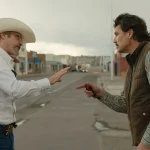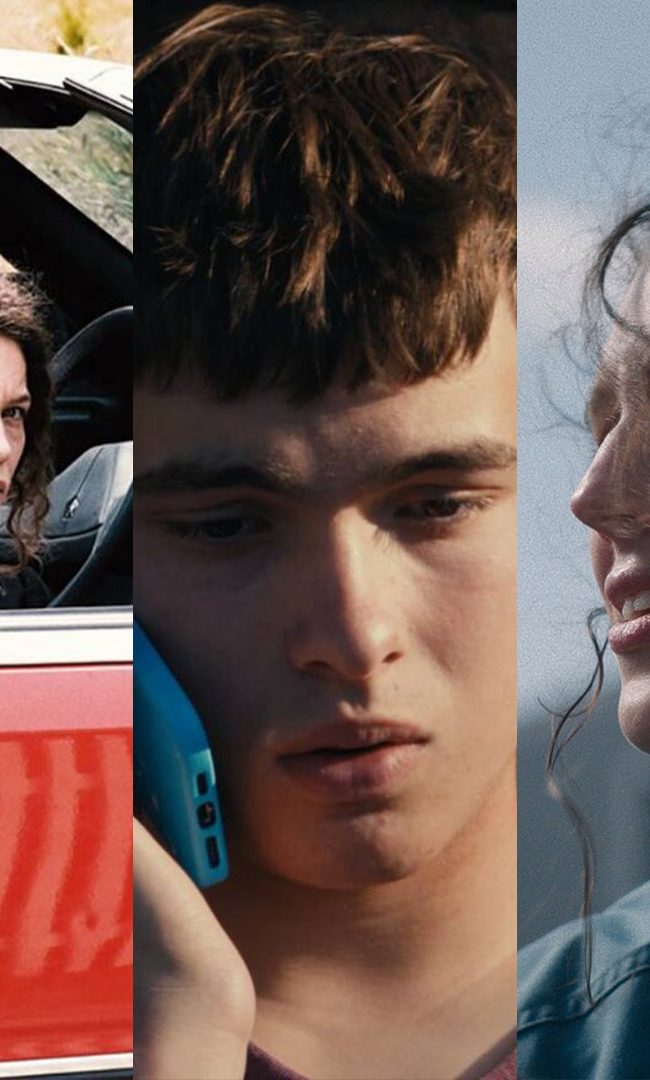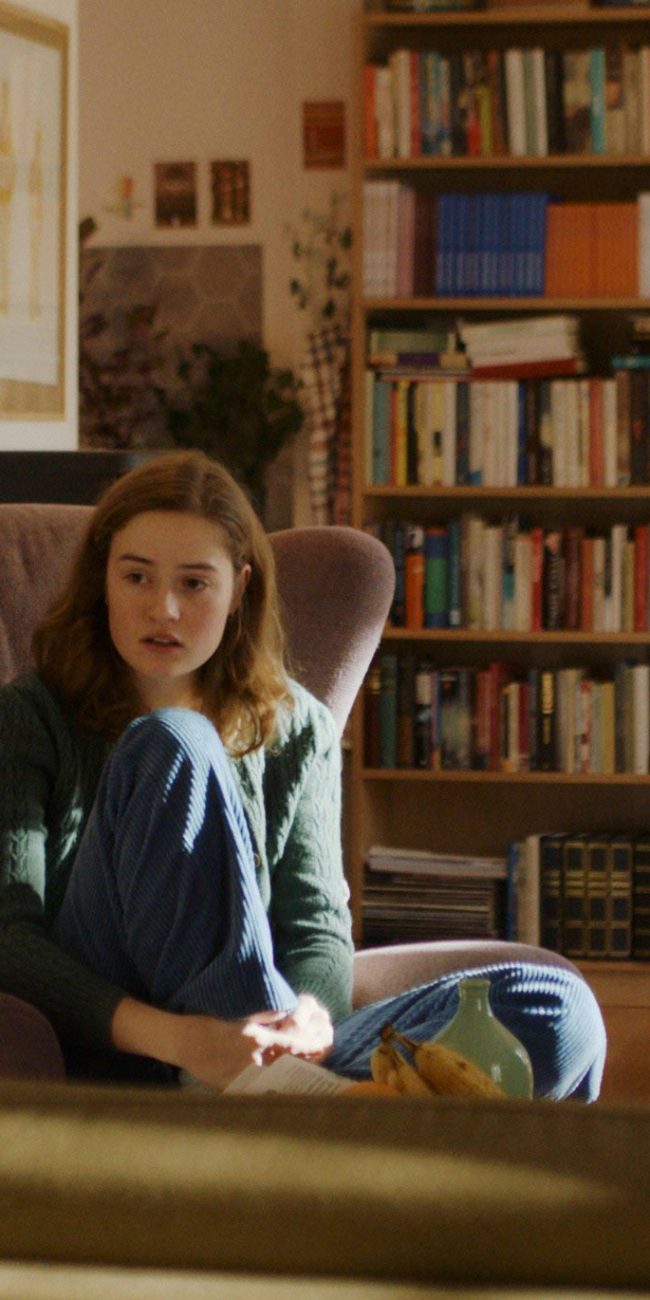A Conversation with Christian Petzold (AFIRE)
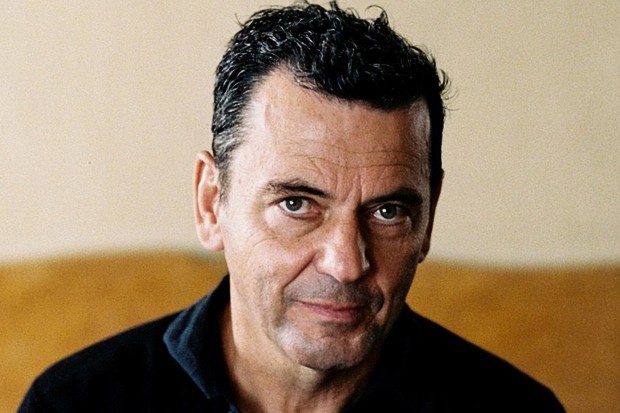
Christian Petzold is a legendary German Auteur. He attended the German film and Television academy of Berlin. His second and third features, which came out in 2005 and 2007, titled Gespenster and Yella Premiered at the Berlin International Film Festival. From that moment Petzold and his films were not just a staple at the Berlin International film festival, but at art house international festivals across the world. His films Phoenix and Transit have received immense critical acclaim. His latest film Afire, which took home the Silver Bear Grand Jury Prize at the Berlin International Film Festival, finds him collaborating with Paula Beer once again. This time Petzold indulges in the Summer Movie genre and creates one of the funniest, and most unique films of the year. The following conversation was edited for length and clarity.
Hammer To Nail: What was the screenwriting and casting process like on this film?
Christian Petzold: The casting started right when we wrapped on Undine. I knew I wanted to make another film with Paula [Beer]. The reference was her. She is the only female character in the movie. I had to create the other main characters so I tried to think back to when I was 25 years old. I think I was an asshole at this time. I have been married for 36 years and my wife says that when she first met me at school in Berlin I was such an asshole. She said that I was very arrogant and thought I knew everything about cinema. I can’t really remember, but I think she is right. I think that the asshole I was in the past is part of the asshole that is Leon. One time I was in a class about Hitchcock. A young female student in the class did a presentation that was really bad. I completely destroyed her. My wife was in the class and she told me I was an asshole on that day. 4 years later I met her again and I had left my asshole shape.
HTN: This film is entrenched in the summer season, the idea of being young and it being the summer time is clearly very important. What is it about the summer that interested you so much for this film?
CP: Something has happened to the summer in Germany. There was a film I saw in 1930 by Billy Wilder called People on a Sunday, that was a summer movie. It was a silent film that showed working class people near a lake, dancing, kissing, and seducing. You can feel the wind and water, the feeling of summer was within this movie. When I thought about summer movies I realized the German summer film was all but dead. The Nazi’s destroyed it. They did not like free bodies and free wind. All the directors of these films had to leave Germany because they were Jewish, Homosexual or Communists. They came to Hollywood and made incredible films like The Lost Weekend, Double Indemnity, etc. Some of them wanted to stay in Germany but there was no place for them. It was destroyed, and so was the summer German film. The Germans do not have a summer genre. For example, the Swedish with the Ingmar Bergman movie Summer with Monika. You can learn so much about young people in these moments because the schools are closed. There is only love, the sea, dreaming and desire. This is summer.
HTN: So you are trying to revive the German summer movie?
CP: Yes, It would be great if we could have summer films again. In our summer movies there are always parents. Who wants a summer movie with parents? The parents can make their own summer movie. I do not like to see students with their parents in the summer. It is perverse.
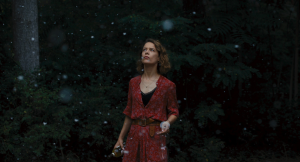
A still from AFIRE
HTN: There is definitely a touch of like Rohmer in the film with that summer feeling but, the film is also oddly horrifying. Did you watch any horror films to prepare?
CP: I love horror films. I have thousands of horror films at home. The problem is my wife does not like horror films very much. My kids are way too young. The Hills Have Eyes, Cabin in the Woods, I love these movies. I said in the Q&A last night that about two years ago it was around 11 PM and I was in bed without my wife. I wanted to watch a horror film so I picked Hostel.
HTN: That is a pretty messed up movie.
CP: It is a summer movie! It is about something that is happening in the post communist era. There is no more work so people start killing each other and selling their body parts. I was totally impressed by the movie. I was also very scared the whole time. I was so tense. I remember my wife came into the room right at the moment where an achilles heel was cut! My wife screamed at me, “You are crazy!” I responded, “That was great!” The start of Afire has something to do with horror. You have this forest, This “shortcut” that they take…
HTN: It is a good setup for a horror film.
CP: Yes exactly.
HTN: Visually this film is stunning, and yet another movie you have shot with Hans Fromm…did you guys approach this film differently and I am wondering how you made the night time sequences have that amazing blue texture?
CP: I love this blue look. In Germany we call it the American night. In Germany, the forest is often the stage for myths and legends. There are stories of large meadows where nymphs come for dancing, and plenty of tales of full moon nights. The full moon, in reality, does not work with the camera. If you make it an American night, this lead blue with hard shadows, then you can create a dream-like atmosphere. Hans Fromm, the DOP, he wanted to make it in regular night, but I am stronger.
HTN: I think you were right, it looks great. When Devid walks by naked at night I first thought there might be an alien situation going on.
CP: Yes, that is right.
HTN: Anyway, “Club Sandwich” is the name of Leon’s book, I laughed very hard when I heard that. How did you come up with the name, “Club Sandwich” and how many pages of the book actually exist?
CP: I have written 3.5 pages. It was very hard for me to write something that was bad. The difficulty was it had to come from the perspective of someone who genuinely thinks it’s good. It was very hard to find the rhythm and the language for this novel. For two days I sat there thinking and finally I found a short story by Fitzgerald, I did not take the entire story, just the ideas behind it and I rewrote it in a German way. I was very proud of these three pages. I read it 2-3 times and thought to myself that it was not bad. Then, we had the first rehearsal. Matthias Brandt who plays the publisher had to read it. All the actors started laughing. I was angry about that, I said, “I am sorry, but it is not that bad.” They said, “no, it is really really bad.” They make jokes a lot and know how to trigger me. This triggered me from this moment on haha. My second film was called Cuba Libre. It was very good for me. Cuba Libre and Club Sandwich are similar in a way.
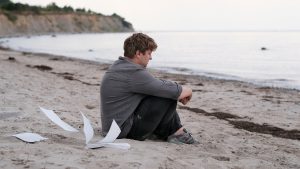
A still from AFIRE
HTN: Devid’s Joke that leads to him kissing Felix is an incredible joke. How did you come up with it?
CP: There was an actor I met 10 years ago who was drunk at a bar and he told me this story. I was really shocked when he kissed me. He is not a very famous actor. I think his only good story is this story. I was his victim. He kissed me on the lips. Immediately I ran to wash my mouth out. I like it when something is a joke and then it bleeds into reality. I like this idea. There is a similar story in Cache directed by Haneke. It is the one about the dog and the scar on its neck. It has a similar structure in the sense that it goes on and on until the audience has no idea where it is going and then, immediately it is in the present via the dog barking in Cache by Haneke.
HTN: The most frustrated I was with Leon was when he would not go to the beach with Nadja. Why would you not let him go to the beach with Nadja.
CP: This day when he is in bed and he is woken up by the sounds of sex, and then he realizes that Nadja is beside him. She says, “Let’s go to the beach.” During our sound mixing, the three sound mixers always shouted at the screen, “Just go with her!” The thing is, he has fear. I think he would drown.
HTN: He is not very into going for a swim.
CP: Haha yes.
HTN: How did you get this amazing location with this summer house?
CP: We started looking for the house in the spring of last year. It was a tragedy because every house we saw was so ugly. Even the owners of the houses were ugly. There was a severe ugliness. We found a house not too far from Berlin. Only an hour by car. It was in the forest. It was a house that was a ruin. Nobody was living there. No electricity, no water, nothing. I said, “Let’s do it here, let’s build it on our own.” It cost us 60,000 Euros to build up the house. It was great to be able to make everything ourselves. I love our set designer. The house he created was so wonderful because it gives the feeling throughout the film that it has been lived in. Most of the houses in this area are homes for vacation. They do not have any character. This house had an old refrigerator, a turntable, etc. Our set designer was inspired by Jack Fisk and the set designers for David Lynch films. The whole idea is that you will only respect a room if you believe it has been filled up with life for many many years.
HTN: Well it worked out great. The house was an excellent location.
CP: On the last day of shooting a production company came to our house. These producers hear everything. They heard I had a great house so they came to our house and took photos. They told us that they wanted to buy it. I said, “No.” Instead I destroyed it. Everything was destroyed. I did not want this asshole of a director, I know him, to get this house. The house was just for this movie.
HTN: I thought that the fire and the ash in this film looked amazing. It has an entrancing quality. How was it achieved?
CP: It is original. The forest fire is CGI, however, we bought ash from China. I had 10 buckets of ash and it gave this snow-like quality. I do not like to use CGI. I love the films of Ray Harryhausen where they use real things. CGI things do not age well. Three days ago I was on the plane and I saw someone watching Avatar. It looks old! Therefore I prefer to do as many practical things as I can. If you are going to use CGI I like to do something practically and have the cgi enhance it. While we were shooting there was a forest fire many Kilometers away. We saw that and took many pictures. We used that as the reference for the fire.
HTN: The final moments here I think are completely masterful. The idea of his life unfolding as the book is read over by his editor was so good. How and when did that come to you?
CP: In Germany there are some critics that I really despise. They always say, “Voiceover is lazy.” The point they are making is that they think voiceovers are used to tell the story instead of showing. For me cinema is always about presence, this moment. When you use voiceover, the present moment becomes a memory. When there is a man and a woman and they stand in front of each other and look into each others eyes, the love exists in this moment. When the audience hears that voiceover of, “and he knows in this moment he will never see her again,” The moment vanishes! This is something I like. The idea that you are in the present of life but at the same time these things are memories. This is the whole idea of summer. We do not live in the summers, we remember them. Summer movies feel like they are being remembered by someone in the winter.
HTN: Thank you so much for taking the time to speak with me today.
CP: Thank you!
– Jack Schenker (@YUNGOCUPOTIS)
Christian Petzold; Afire movie review

